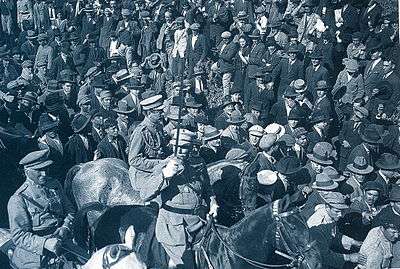28 May 1926 coup d'état
The 28 May 1926 coup d'état, sometimes called 28 May Revolution or, during the period of the authoritarian Estado Novo (English: New State), the National Revolution (Portuguese: Revolução Nacional), was a military coup of a nationalist origin, that put an end to the unstable Portuguese First Republic and initiated 48 years of authoritarian rule in Portugal. The regime that immediately resulted from the coup, the Ditadura Nacional (National Dictatorship), would be later refashioned into the Estado Novo (New State), which in turn would last until the Carnation Revolution in 1974.
| 28 May 1926 coup d'état | |||||||
|---|---|---|---|---|---|---|---|
 | |||||||
| |||||||
| Belligerents | |||||||
| Commanders and leaders | |||||||
|
|
| ||||||
The chronic political instability and government's neglect of the army created opportunities for military plots. Already in 1925 there were two failed coup attempts on 18 April and 19 July. The plotters were acquitted by military court. During winter of 1925 and spring 1926 a group of junior officers planned a new coup and were looking for a senior officer to be the figurehead of their movement. They decided on General Manuel de Oliveira Gomes da Costa, who agreed to join the plotters on 25 May.[1]
The revolution started in Braga, commanded by General Manuel Gomes da Costa, followed immediately in Porto, Lisbon, Évora, Coimbra and Santarém. The revolution triumphed when General Gomes da Costa marched on Lisbon along with 15,000 men, being acclaimed by the people of the city.[2]
Timeline
- 27 May:
- General Manuel de Oliveira Gomes da Costa arrived at Braga with the purpose of initiating a coup d'état.
- The First Portuguese Republic and Prime Minister António Maria da Silva, knowing of the forthcoming coup, tried to organize resistance -- believing an eventual coup d'état could be defeated.
- 28 May:
- A military coup d'état (hereinafter "the 28.5.26 coup d'état") began in Braga led by Gomes da Costa. Initially believing he failed, Gomes da Costa announced his surrender.
- 29 May:
- The Portuguese Communist Party interrupted its Second Congress due to the political and military situation in the country.
- The Confederação Geral do Trabalho (General Confederation of Labour) declared its neutrality in all military confrontations.
- The 28.5.26 coup d'état spread to the rest of the country -- influenced Mendes Cabeçadas, Sinel de Cordes and Óscar Carmona -- and established the Ditadura Militar (National Military Dictatorship) against the democratic but unstable First Portuguese Republic.
- The Government of Prime Minister António Maria da Silva resigned.
- 30 May:
- The General Gomes da Costa was acclaimed in Porto.
- The president of the republic, Bernardino Machado, resigned.
- José Mendes Cabeçadas Júnior became Prime Minister and President of the Republic.
- 3 June: António de Oliveira Salazar became Minister of Finance; however, he resigned 16 days after.
- 3 June: A dictatorial decree dissolved the Congress of the Republic of Portugal (National Assembly).
- In addition, by dictatorial decree, the leaders of all the Municipalities were sacked.
- The Ditadura Militar banned the Carbonária.
- The Ditadura Militar banned all Political parties.
- 17 June: General Gomes da Costa provoked a second coup d'état.
- 19 June: General Gomes da Costa became Prime Minister.
- 22 June: The Ditadura Militar instituted Censorship.
- 29 June: General Gomes da Costa became President of the Republic.
- 9 July:
- The Ditadura Militar forced General Gomes da Costa to resign -- allowing him to go into exile.
- General António Óscar de Fragoso Carmona, of the conservative military wing of the Ditadura Militar, became Prime Minister.
- 15 September: A military coup d'état failed.
- 18 September: Another military coup d'état failed.
- 29 November: General António Óscar Carmona became President of the Republic.
- 16 December: The Ditadura Militar created a political police called Police of Information of Lisbon.
References
- Tom Gallagher, Portugal: A Twentieth-century Interpretation, 1983, p. 62.
- Laidlar, John (1 January 2000). Portugal. Clio. ISBN 9781851093311.
.png)